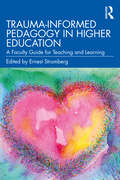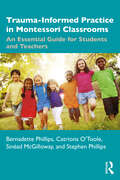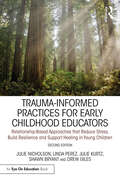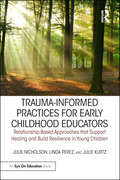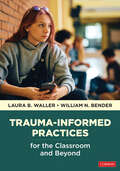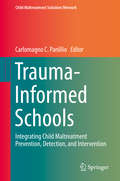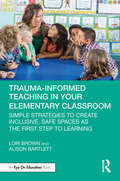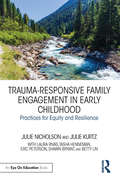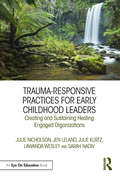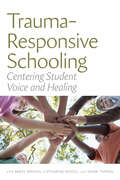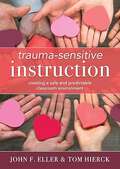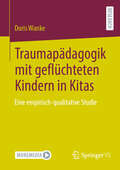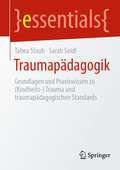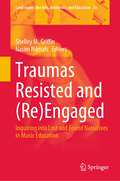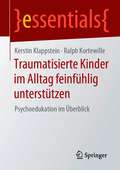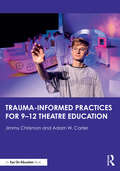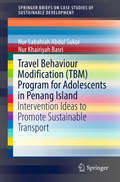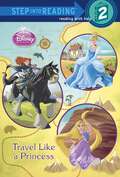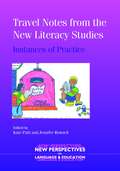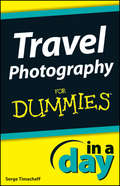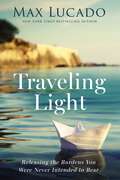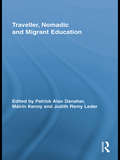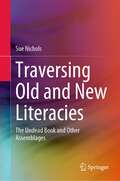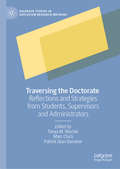- Table View
- List View
Trauma-Informed Pedagogy in Higher Education: A Faculty Guide for Teaching and Learning
by Ernest StrombergThis volume explores the current state of student mental health and trauma while offering theories and practice of trauma-informed teaching and learning. The interdisciplinary authors gathered in this collection discuss the roles, practices, and structures in higher education that can support the wellness and academic success of students who suffer from the effects of traumatic experiences. Chapters cover topics on teaching traumatic materials ethically and effectively, reading and writing to support recovery and healing from trauma, inclusive pedagogies responsive to systemically inflicted trauma, and developing institutional structures to support trauma-informed pedagogies. This timely and important book is designed for faculty in institutions of higher education seeking to meaningfully cultivate trauma-informed classes and learning experiences for their students.
Trauma-Informed Practice in Montessori Classrooms: An Essential Guide for Students and Teachers
by Stephen Phillips Bernadette Phillips Catriona O'Toole Sinéad McGillowayTrauma-Informed Practice in Montessori Classrooms provides important historical and contemporary evidence of the potential for Montessori schools to act as “healing” environments for children and young people. Drawing upon fascinating archival evidence and contemporary trauma theory, it shows how authentic Montessori schools already have the infrastructure to promote and embed trauma-informed practice (TIP) in their classrooms.The book provides cutting-edge, interdisciplinary knowledge on trauma and highlights its potential to negatively impact the emotional, social, and cognitive functioning of children and young people. It explains clearly and precisely the principles of TIP and how historically, these were woven into the fabric of the early Montessori schools, resulting in their reputation as “Case della Salute” or “Health Homes.” The book shows how this almost forgotten “healing” element of Montessori schools can be revived, harnessed, and promoted in ways that would benefit the overall health and well-being of children and young people.This timely book is highly informative, hugely practical, and reader-friendly. It includes features such as boxed chapter objectives, learner outcomes, vignettes, chapter summaries, and questions for group discussion. It provides an invaluable guide for Montessori teachers and students, for home educators using the Montessori approach, and for non-Montessori educators and parents.
Trauma-Informed Practices for Early Childhood Educators: Relationship-Based Approaches that Reduce Stress, Build Resilience and Support Healing in Young Children
by Julie Nicholson Linda Perez Julie Kurtz Shawn Bryant Drew GilesThis second edition of Trauma-Informed Practices for Early Childhood Educators continues to guide childcare providers and early educators working with infants, toddlers, preschoolers and early elementary-aged children to understand trauma as well as its impact on young children’s brains, behavior, learning and development. The book covers a range of trauma-responsive teaching strategies that readers can use to create strength-based environments that support children’s health, healing and resiliency. Updates include a greater emphasis on resilience and collaborating with mental health specialists, new chapters on developing children’s body awareness/sensory literacy and pathways to regulation that reduce stress through breathing techniques and mindful movement, as well as new vignettes and case studies to use in workshops or professional development. Supervisors and coaches will learn a range of powerful trauma-responsive practices that they can use to support workforce development and enhance their quality improvement initiatives.
Trauma-Informed Practices for Early Childhood Educators: Relationship-Based Approaches that Support Healing and Build Resilience in Young Children
by Julie Nicholson Linda Perez Julie KurtzTrauma-Informed Practices for Early Childhood Educators guides child care providers and early educators working with infants, toddlers, preschoolers, and early elementary aged children to understand trauma as well as its impact on young children’s brains, behavior, learning, and development. The book introduces a range of trauma-informed teaching and family engagement strategies that readers can use in their early childhood programs to create strength-based environments that support children’s health, healing, and resiliency. Supervisors and coaches will learn a range of powerful trauma-informed practices that they can use to support workforce development and enhance their quality improvement initiatives.
Trauma-Informed Practices for the Classroom and Beyond
by William N. Bender Laura B. WallerFind the right strategies and tools to support students who experience trauma Studies show that 46-75% of children experience trauma, often resulting in challenging behavior, depression, and anxiety as well as long-term physical and mental health issues. Today’s educators, counselors, and clinicians need the right strategies to help. Written by experts with years of experience working with children and teens exposed to adverse childhood experiences (ACEs), Trauma-Informed Practices for the Classroom and Beyond describes the most effective tools available and walks you through how to implement them with compassion and fidelity. Inside, you’ll find Detailed and easy-to-implement interventions that alleviate the effects of trauma, including mindfulness, journaling, restorative justice, and more Trauma-informed practices to use with all students, regardless of their age or the duration or frequency of their trauma exposure Ways educators can prepare their classrooms and schools to support students who experience ACEs This how-to guide and its companion website with discussion points, recommended videos, and additional resources equips you with evidence-based techniques and instructions to support children and teens with ACEs and enhances your practice to better serve the students who need our help most.
Trauma-Informed Practices for the Classroom and Beyond
by William N. Bender Laura B. WallerFind the right strategies and tools to support students who experience trauma Studies show that 46-75% of children experience trauma, often resulting in challenging behavior, depression, and anxiety as well as long-term physical and mental health issues. Today’s educators, counselors, and clinicians need the right strategies to help. Written by experts with years of experience working with children and teens exposed to adverse childhood experiences (ACEs), Trauma-Informed Practices for the Classroom and Beyond describes the most effective tools available and walks you through how to implement them with compassion and fidelity. Inside, you’ll find Detailed and easy-to-implement interventions that alleviate the effects of trauma, including mindfulness, journaling, restorative justice, and more Trauma-informed practices to use with all students, regardless of their age or the duration or frequency of their trauma exposure Ways educators can prepare their classrooms and schools to support students who experience ACEs This how-to guide and its companion website with discussion points, recommended videos, and additional resources equips you with evidence-based techniques and instructions to support children and teens with ACEs and enhances your practice to better serve the students who need our help most.
Trauma-Informed Schools: Integrating Child Maltreatment Prevention, Detection, and Intervention (Child Maltreatment Solutions Network)
by Carlomagno C. PanlilioThis book provides an interdisciplinary framework for school intervention into child and adolescent maltreatment, highlighting the unique potential for schools to identify and mitigate the long-term impacts of childhood trauma on children’s educational well-being. Contributors evaluate recent efforts to incorporate trauma-informed approaches into schools, including strategic planning by administrators, staff training, prevention programming, liaising with local youth service agencies, and trauma-sensitive intervention with affected students.Among the topics discussed:• The developmental impact of trauma• The role of schools and teachers in supporting student mental health• Prevention programming to prevent child and adolescent sexual abuse• Education policies to support students with traumatic histories• Responding to childhood trauma at both macro and microsystem levelsTrauma-Informed Schools: Integrating Child Maltreatment Prevention, Detection, and Intervention is a valuable resource for child maltreatment researchers, educational and school psychologists, school social workers, students in early childhood and K-12 education, and education policy makers at all levels of government. It offers the necessary guidelines and insights to facilitate better learning for students who have experienced trauma, aiming to improve student well-being both inside and outside the classroom.
Trauma-Informed Teaching in Your Elementary Classroom: Simple Strategies to Create Inclusive, Safe Spaces as the First Step to Learning
by Alison Bartlett Lori BrownResearch has proven that childhood trauma affects school engagement and success while at the same time recognizing that the majority of students have experienced it. This book offers simple strategies, based on evidence-based studies, that elementary educators can use to effectively recognize trauma, teach resilience, and support their students in being ready to learn. The book covers all the tenets of trauma-informed teaching, including understanding the effects of trauma, creating safety and predictability, fostering healthy attachments, and modeling resilience as part of social emotional learning, all of which are framed within cultural humility and competence. Designed for all teachers, professionals, and school administrators working with elementary students, this practical guide is key reading for creating a safe classroom and school environment that is inclusive of all learners and conducive for learning.
Trauma-Responsive Family Engagement in Early Childhood: Practices for Equity and Resilience
by Julie Nicholson Julie KurtzDesigned for all professionals working with parents and families of young children, this practical guide offers comprehensive resources for building trauma-responsive family engagement in your school or program. Throughout this book, you'll find: Evidence-based practices that promote trauma-response family engagement. Exercises and tools for identifying the strengths and learning edges within your program, school, or agency. Vignettes from people and programs striving to create trusting, asset-focused partnerships with families that improve equity and promote culturally responsive practices. Reflective inquiry questions and sample conversations to help you examine your own practices. With concrete examples and easy-to-implement strategies, this critical book helps readers put theory into practice while providing essential support for individuals and groups both new to and experienced with trauma-responsive practices in early childhood.
Trauma-Responsive Practices for Early Childhood Leaders: Creating and Sustaining Healing Engaged Organizations
by Julie Nicholson Julie Kurtz LaWanda Wesley Jen Leland Sarah NadivSpecifically designed for administrators and leaders working in early childhood education, this practical guide offers comprehensive resources for creating trauma-responsive organizations and systems. Throughout this book, you'll find: Exercises and tools for identifying the strengths and areas in need of change within your program, school or agency. Reflection questions and sample conversations. Rich vignettes from programs already striving to create healthier, trauma-responsive environments. The guidance in this book is explained with simple, easy-to-implement strategies you can apply immediately to your own practice and is accompanied by brainstorming questions to help educational leaders both new to and experienced with trauma-informed practices succeed.
Trauma-Responsive Schooling: Centering Student Voice and Healing
by Lyn Mikel Brown Catharine Biddle Mark TappanTrauma-Responsive Schooling outlines a novel approach to transforming American schools through student-centered, trauma-informed practices.The book chronicles the use of an innovative educational model, Trauma-Responsive Equitable Education (TREE), as part of a multiyear research project in two elementary schools in rural Maine. In this model, Lyn Mikel Brown, Catharine Biddle, and Mark Tappan endorse whole-school change, encouraging educators to upend traditional classroom power dynamics by listening foremost to student voices, validating student experiences, and promoting student agency.The authors provide complex real-life examples of student involvement in the creation and implementation of trauma-responsive and equitable practices. Their work offers readers concrete, actionable examples of such practices, which include supporting the whole child by promoting social and emotional learning (SEL) as well as academic achievement; providing access to basic needs such as food, clothing, and health care; and meeting the instructional requirements of dual-language learners.Many rural schools in the United States experience low student achievement and high absenteeism rates as their geographically isolated communities struggle with poverty, substance abuse, and other significant stressors. Yet, as the authors demonstrate, supportive learning environments, even in under-resourced rural schools, are able to mitigate adversity, stress, and trauma—and thus promote healing.This heartening work illustrates that, when educators and school leaders put student needs and interests at the core of school life, long-lasting change for all students is possible.
Trauma-Sensitive Instruction: Creating a Safe and Predictable Classroom Environment
by John F. Eller & Tom HierckThe impact of trauma on learning can be significant and long lasting. Learn how you can confidently and meaningfully support your trauma-impacted students and foster trauma-informed schools with this accessible resource. The authors draw from their personal and professional experiences with trauma, mental health, and school culture to provide real insight into what you can do now to help learners build resilience, cope with adverse situations, and achieve at high levels.
Traumapädagogik mit geflüchteten Kindern in Kitas: Eine empirisch-qualitative Studie
by Doris WankeDoris Wanke führt in diesem Buch eine Analyse über Traumpädagogik in Kitas am Beispiel von geflüchteten Kindern durch. Innerhalb dieser empirischen qualitativen Studie wurden einerseits frühpädagogische Fachkräfte aus Kindertageseinrichtungen mit geflüchteten Kindern im Alter zwischen drei und sieben Jahren mittels Gruppendiskussionen zur Traumapädagogik befragt. Andererseits erfolgte die Erhebung mittels leitfadengestützen Expert*inneninterviews von Traumaexpert*innen, die zu Traumapädagogik Fort- und Weiterbildungen anbieten. Untersucht werden u. a. die (trauma-)pädagogischen Wissensstände der Fachkräfte und in welchen Bereichen Handlungs-, Fortbildungs-, Schulungs- und Unterstützungsbedarf gesehen wird. Entstanden ist ein eigenes berufsbezogenen früh- und traumapädagogisches Handlungs-, Wissens- und Kompetenzmodell.
Traumapädagogik: Grundlagen und Praxiswissen (Kindheits-) Trauma und traumapädagogische Standards (essentials)
by Sarah Seidl Tabea StaubDieser Band liefert fundiertes Grundlagenwissen für die Arbeit mit traumatisierten Kindern und Jugendlichen und bietet damit Fachkräften die notwendige Sicherheit in der täglichen Arbeit. In der stationären Jugendhilfe sind Traumata bei Kindern und Jugendlichen in einem überdurchschnittlich hohen Maße vorzufinden. Dadurch sind Fachpersonen in diesen Berufsfeldern fast tagtäglich mit dieser Thematik und den daraus resultierenden Auswirkungen konfrontiert. Umso wichtiger ist ein fundiertes Wissen zu Trauma und Traumapädagogik, welches dieser Band für Fachkräfte praxisnah aufbereitet. .
Traumas Resisted and: Inquiring into Lost and Found Narratives in Music Education (Landscapes: the Arts, Aesthetics, and Education #36)
by Shelley M. Griffin Nasim NiknafsThis book focuses on the traumatic experiences within and through music that individuals and collectives face, while considering ways in which they (re)engage with their traumas in educational settings. The chapters delve into the physical, psychological, philosophical, sociological, and political aspects, as they relate to the reciprocal influences of trauma on musical practices and education. Readers are immersed in topics related to societal violence, physical injuries, grief, separation, loss, death, and ways of working through these in educational and artistic situations. In the introductory chapter, the co-editors draw attention to theoretical matters related to trauma through narrative inquiry in music education. The first section of the book, Separation Revisited, brings together notions of separation, focusing on how loss is emotionally and physically manifested when death, grief, and bodily injury are experienced. In the second section, (Re)Engaging with Lost and Found, readers are encouraged to imagine new possibilities considering trauma and loss in educational and musical spaces. These pieces offer deliberate ruminations moving the discourse toward (re)engagement in and through music education and artistic contexts. The co-editors conclude the book by drawing attention to narrative inquiry’s double-edged nature in stories of trauma and how the retelling of lost and found narratives offers a way to imagine lives otherwise—lives not smothered by grief and horror—through the conceivable reliving of unfathomable stories of experience. This book emerges from the 7th International Conference on Narrative Inquiry in Music Education (NIME7), October 2020, co-hosted by Brock University, Faculty of Education and the University of Toronto, Faculty of Music, Ontario, Canada.
Traumatisierte Kinder im Alltag feinfühlig unterstützen: Psychoedukation im Überblick (essentials)
by Kerstin Klappstein Ralph KortewilleDieses essential beschreibt alltagstauglich und fundiert, wie Kinder mit Bindungstraumatisierung feinfühlig begleitet werden können. Es erklärt leicht verständlich, wie sich Traumapädagogik und Traumapsychotherapie ergänzen. Gerade wenn das Kind in Krisen am dringendsten Verständnis, Orientierung und Beruhigung von seinen Bezugspersonen braucht, liegen deren Nerven oft blank. Dieses essential will Erwachsene dabei unterstützen, das Verhalten des Kindes vor dem Hintergrund dessen Biografie zu verstehen. Diese Reflexion hilft dabei, Unterstützungsangebote zwischen hilfreicher Distanz und förderlicher Empathie auszubalancieren zu können.
Trauma–Informed Practices for 9-12 Theatre Education
by Jimmy Chrismon Adam W. CarterThis resource bridges the worlds of education, mental health, and the performing arts to offer a comprehensive roadmap for 9–12 theatre educators looking to promote safe, supportive, and creative spaces for their students. Written by a seasoned theatre educator and a licensed mental health clinician, this book explores trauma-informed teaching techniques tailored specifically for theatre classrooms, encompassing both acting and production processes. Chapters cover a broad range of topics, from fostering resilience in students to collaborating with caregivers, administrators, and communities across the educational journey. The authors introduce essential concepts such as intimacy direction and consent, ensuring ethical and inclusive practices. They also provide strategies for teachers to prioritize their own self-care. Core themes and objectives include: trauma-informed teaching, holistic theatre production, community engagement, ethical theatre practices, and educator wellness. Packed with practical exercises for exploration, discussion questions for book studies, and meticulously researched insights, this resource strikes a balance between therapeutic guidance and professional development. Ideal for 9–12 theatre educators in drama classrooms, after-school programs, and more, this guide equips you with the tools to support students who may have experienced trauma, empowering them in performing arts environments while maintaining healthy boundaries.
Travel Behaviour Modification: Intervention Ideas to Promote Sustainable Transport (Springerbriefs On Case Studies Of Sustainable Development Ser.)
by Nur Khairiyah Basri Nur Sabahiah SukorThis book discusses the potential of travel behaviour modification (TBM) as a persuasive tool to promote low-carbon mobility among adolescents on Penang Island by highlighting the role of bus usage in a sustainable urban lifestyle. The participants of the Reduce Carbon Footprint Campaign, which aimed to create sustainable transport and pro-environmental awareness among adolescents, were recruited from secondary schools on Penang Island. Campaign materials, such as bus routes maps and discount travel cards for students, were provided by Rapid Penang, the leading bus operator in Penang. The campaign also involved several intervention programmes, including motivational sessions and classes for travel journey planning.
Travel Like a Princess (Step into Reading)
by Melissa LagonegroAriel, Merida, Sleeping Beauty, and all the Disney princesses embark on royal journeys in this Step 2 reader! Children ages 4 to 6 will love reading about the princesses' travels on vacations and trips of their own. Step 2 readers use basic vocabulary and short sentences to tell simple stories. For children who recognize familiar words and can sound out new words with help.
Travel Notes from the New Literacy Studies
by Jennifer Rowsell Kate PahlThis book joins two important fields, that of literacy and multimodality, with a focus on local and global literacies. Chapters include work on media, popular culture and literacy, weblogs, global and local crossings, in and out of educational settings in such locations as the US, the UK, South Africa, Australia and Canada.
Travel Photography In A Day For Dummies (In A Day For Dummies)
by Serge TimacheffTake better travel shots on your next vacation with this terrific, 100-page e-book! From pro to hobbyist, from short weekends to dream vacations, every photographer wants to be able to capture memorable and compelling travel photos. Now you can hit the road with this fast-paced, In A Day For Dummies e-book that really zeros in on how to best capture eye-popping travel photos. Find out how to set your camera, make adjustments on the fly, prepare for all kinds of light--even get great shots with your smartphone. You'll go through this handy e-book in a day, and capture photos for a lifetime. Focuses on techniques for capturing fantastic travel photos, no matter where you are or what kind of camera Covers setting the camera for the shot, making adjustments on the fly, lighting and composition, using a smartphone camera, and editing and sharing your photos Includes a "Beyond the book" online component, where you can find step-by-step tutorials, videos, and a bonus lesson on creating a high-dynamic range travel photo Online extras also include a photo book, how to make money selling your photos, and a gallery of unique travel photos to inspire you Get Travel Photography In A Day For Dummies, grab your camera, and hit the road!
Traveling Light: Releasing the Burdens You Were Never Intended to Bear
by Max LucadoWe're all weighed down by loads we were never intended to carry. With New York Times bestselling author and pastor Max Lucado as your guide, Traveling Light invites you to release some of those heavy burdens and experience true rest.We've all seen weary travelers—everything they own crammed into their luggage, staggering through terminals and hotel lobbies with overstuffed suitcases, trunks, duffels, and backpacks. Backs ache. Feet burn. Eyelids droop. We can all be people like that—if not with our physical luggage, then at least with our spiritual load of guilt, discontentment, doubt, or loneliness.Centered around the comforting, uplifting words of Psalm 23, Traveling Light will give you the encouragement and the tools you need to release the burdens of:Self-relianceArroganceHopelessnessDisappointmentShameThere are certain weights in life that we simply aren't designed to carry, and Max reminds us that the Lord is asking you to set them down and trust him. He is the father at the baggage claim. When a dad sees his five-year-old son trying to drag the family trunk off the carousel, what does he say? The father will say to his son what God is saying to you."Set it down, child. I'll carry that one."What if we took God up on his offer? We just might find ourselves traveling a little lighter.
Traveller, Nomadic and Migrant Education (Routledge Research in Education)
by Patrick Danaher Máirín Kenny Judith LederTraveller, Nomadic and Migrant Education presents international accounts of approaches to educating mobile communities such as circus and fairground people, herders, hunters, Roma and Travellers. The chapters focus on three key dimensions of educational change: the client group moving from school to school; those schools having their demographics changed and seeking to change the mobile learners; and these learners contributing to fundamental change to the nature of schooling. The book brings together decades of research into the challenges and opportunities presented by mobile learners interacting with educational systems predicated on fixed residence. It identifies several obstacles to those learners receiving an equitable education, including negative stereotypes and centuries-old prejudice. Yet the book also explores a number of educational innovations that bring mobility and schooling together, ranging from specialised literacy programs and distance and online education to mobile schools and specially trained teachers. These innovations allow us to think differently about how education can and should be, for mobile and non-mobile learners alike.
Traversing Old and New Literacies: The Undead Book and Other Assemblages
by Sue NicholsThis book re-examines the field of New Literacy Studies and promotes a shift away from binary constructions of literacies as 'old' or 'new' and to encourage critical reflection on the part of readers as to the uses of these constructs. First, the book examines the entanglement of pasts, presents and futures in contemporary literacy practices. Second, it considers representations of literacies as actors, having their own power and consequences. Third, it critically examines the place of 'new' and 'old' literacies in a marketplace in which social, economic and political power advantage is contested. The book demonstrates the use of assemblage theory drawing on semiotics, geo-semiotics and Actor Network Theory for analyzing literacies as assemblages. It provides readers with tools of analysis with which to interrogate claims made for the value of literacy, innovations and traditions alike. It also discusses implications for literacy policy, curriculum, teacher education and research.
Traversing the Doctorate: Reflections and Strategies from Students, Supervisors and Administrators (Palgrave Studies in Education Research Methods)
by Marc Clarà Patrick Alan Danaher Tanya M. MachinThis book explores the multiple ways in which doctoral programs are traversed by students, supervisors and administrators. Rather than proposing a single, homogeneous approach as the most effective form of doctoral education, the editors and contributors focus on the diversity of global approaches to the doctorate, including doctoral experiences from Australia, Finland, Chile, New Zealand and Spain. The doctorate emerges from this analysis as a highly complex, heterogeneous and situated phenomenon that resists easy solutions. Strategies that are successful in traversing the doctorate are found to be grounded in contexts that cannot necessarily be generalised to other situations: in doing so, the authors emphasise the importance of presenting a diverse array of experiences and stories. The separate and shared perspectives of doctoral students, supervisors and administrations are mapped and analysed in ways that bring their voices compellingly to life: this book will be of interest and value to students and scholars of the doctoral journey, as well as of international and comparative education.
